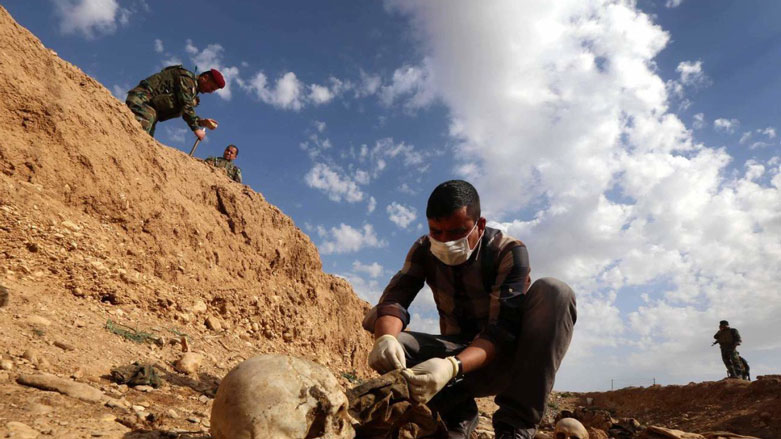Raging wildfires have destroyed several Yezidi mass graves: KRG minister

ERBIL (Kurdistan 24) – A new wave of crop fires in Nineveh has spread beyond farmlands and burned several mass graves which contain the remains of Yezidi (Ezidi) victims, a minister in the Kurdistan Regional Government (KRG) said on Sunday.
Baravan Hamdi, the KRG’s Deputy Minister of Martyrs and Anfal Affairs, told local media that some of the mass graves in Sinjar (Shingal) had been affected by the wildfires.
“In the Kojo village, two mass graves were burned; one was burned in Tel-Banat, and another in Hardan village,” Hamdi said.
On March 15, the Federal Government of Iraq, the KRG, and the United Nations Investigative Team for the Accountability of Islamic State crimes (UNITAD) marked the beginning of national efforts to unearth the first mass graves of Ezidi victims.
Related Article: Iraq and UN begin exhuming first Yezidi mass grave in Sinjar
“Due to the post-Ramadan holidays, the unearthing was temporarily put on hold,” Hamdi explained. “However, in coordination with Baghdad, we will continue in a week.”
“We have two teams on standby, one for the Shingal graves, and the other for the three mass graves in Samawa city.”
On May 22, UNITAD announced it had completed the unearthing of 12 of the 79 mass graves found with the help of “local community and survivor advocate groups.”
Khidr Diro, a member of the Ezidi spiritual council, told local media that aside from individual graves, the Islamic State has tried to burn mass graves to erase evidence of the genocide it committed against the ethnoreligious minority.
“The crop fires pose a threat to the remaining mass graves in Shingal,” Diro stated, calling on authorities and the international community to act immediately to preserve the mass graves.
Iraq’s forensics administration office recently began DNA tests on the remains of 141 bodies which were located in the Shingal region.
The religious minority suffered heavily at the hands of the Islamic State following its emergence in Iraq in 2014, including mass executions. The occupation of the town of Shingal led to the displacement of hundreds of thousands of Ezidi.
Editing by Karzan Sulaivany
